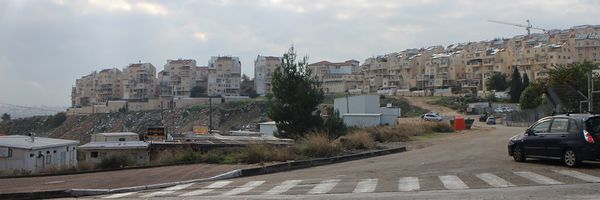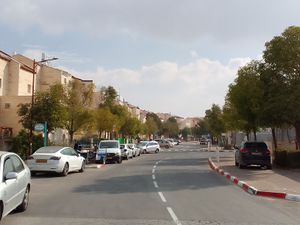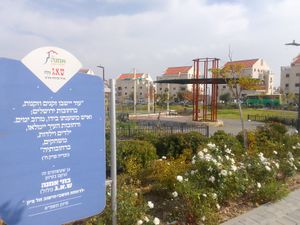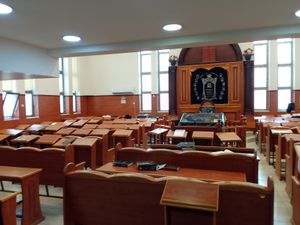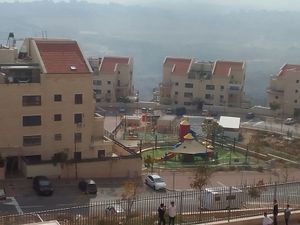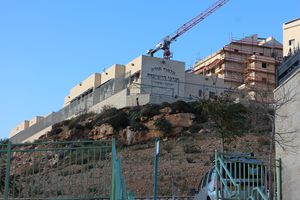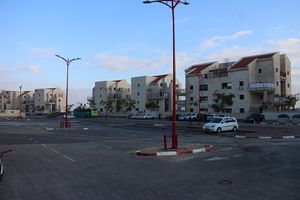Difference between revisions of "Tel Tzion"
m |
|||
| (5 intermediate revisions by 3 users not shown) | |||
| Line 1: | Line 1: | ||
[[File:Tel Tzion general view.jpg|thumb|General view of Tel Tzion|alt=|600x600px]] | [[File:Tel Tzion general view.jpg|thumb|General view of Tel Tzion|alt=|600x600px]] | ||
| − | '''Tel Zion''' (Hebrew: תל ציון), established in | + | '''Tel Zion''' (Hebrew: תל ציון), established in 2000, is a Chareidi yishuv in the Binyomin region that borders a religious zionist community called Kochav Ya’akov. Tel Zion is about 10 minutes north of Yerushalayim's Pisgat Ze'ev and Neve Yaakov neighborhoods and 25 minutes north of the center of the city. |
| + | |||
| + | [https://drive.google.com/drive/folders/1ErXmZlgDoanGVCJFaSmvbH5NMdHBHHF9?usp=sharing Pictures of Tel Tzion] | ||
==History:== | ==History:== | ||
| − | Tel Zion was established in 1990 by a Viznitz entrepreneur, | + | Tel Zion was established in 1990 by a Viznitz entrepreneur, Rabbi Kosover was chosen as the the Mara D'asra and a mainly Chasidish kehilla was built. Due to lack of growth the Chasidish community dwindled, and when the permits expired, a group of sephardim saw the potential and marketed apartments to the sephardic community. Until around 2017 the town was predominantly sefardi, however Rabbi Shalom Koledetzki, seeing the potential for cheaper housing for yungerlite, marketed 400 units to kollel bnei Torah, shifting the dynamic to a more balanced community, with the Ashkenazim equaling nearer to half of the town's population. |
==Population:== | ==Population:== | ||
| − | Currently the town boast | + | Currently the town boast approximately 1350 families, around 60% Sephardi families and 40% Ashkenazi. There is also a Chabad community of around 50 families. |
| − | + | ||
| + | There is a sense of achdus between the different streams of Chariedim represented in Tel Tzion (Litvish, Chassidish, and Sephardi). This was even noted by Rav Shlomo Amar who visited the yishuv a few years ago. | ||
| + | [[File:Road in Tel Tzion.jpg|thumb]] | ||
| + | The majority of Ashkenazim are younger kollel families but multiple people noted that working men are also respected and feel part of the community. | ||
| + | [[File:Tel Tzion.jpg|thumb|Park surrounded by apartment buildings built in most recent building project in Tel Tzion]] | ||
| + | The town was built in three sections. The first section was originally built in the 1990's, and the next two projects were built more recently, one about 7 years ago and another just 3 years ago. | ||
| + | |||
| + | The majority of residents learn or work in Yerushalayim. Unlike other Yishuvim in Binyomin, the majority of residents in Tel Tzion are not settled there for ideological reasons but rather for the affordability and proximity to Yerushalayim. However, the residents connection to the area and their sense of belonging has been growing every year. | ||
| + | |||
| + | There is a sizeable anglo population in Tel Tzion but they are fully integrated into the Israeli community. Many of the leaders of the community are American or English-speakers including the three leading Ashkenazi Rabbanim, the Gabbai of Kupat Hatzdaka (R' Daniel Heyman), and the leader of the children's after school program (R' Shmuel Goodman). | ||
| + | |||
| + | Residents describe Tel Tzion as having a relaxed, out-of-town feel without the social pressure that may be found in other areas. There is a sense of community and residents participate in each other's simchas. | ||
| + | |||
| + | Residents enjoy the local hiking trails and springs in close proximity to Tel Tzion. In Beit El, a 15 minutes drive away, there is a petting zoo that children enjoy visiting. | ||
| + | |||
| + | The three main roads in Tel Tzion are called, Ahavas Shalom, Ahavas Emes, and Ahavas Yisroel. | ||
==Rabbonim:== | ==Rabbonim:== | ||
| − | There Is one Ashkenazi Mora Deasra, Rabbi Avraham Goldberg, alumnus of Ateres, and Mot"z on the Ahavat Shalom Beis Din. | + | There Is one Ashkenazi Mora Deasra, Rabbi Avraham Goldberg, alumnus of Ateres, and Mot"z on the Ahavat Shalom Beis Din. Rabbi Goldberg speaks English fluently. |
| + | |||
| + | Rav Frankenthal, Rav of Kochav Yaakov and Rosh Kollel. Rav Frankenthal is originally from America and was a talmid of Rav Dovid Feinstein zt"l. | ||
| + | |||
| + | Rav Yechezkel Sharfer, Rav of the Chassidic shul. Rav Sharfer is originally from Monsey and also an English-speaker. | ||
Rabbi Ochna | Rabbi Ochna | ||
| Line 16: | Line 37: | ||
==Shuls== | ==Shuls== | ||
| − | The Ashkenazi Community boasts 2 shuls, both under the | + | The Ashkenazi Community boasts 2 main shuls, both under the auspices of Rabbi Avraham Goldberg, Avi Ezri and Beis Moshe, both are of similar nature, but each mainly serves their local area. Beis Moshe was built liluy nishmas a niftar in the Meron tragedy. Both the main shuls host a night kollel open to all residents of the yishuv. |
| + | [[File:Shul in Tel Tzion.jpg|thumb|The Avi Ezri Shul]] | ||
| + | Recently there has been a third ashkenazi minyan on Shabbos, established in the girls' school since the main shuls are B"H reaching capacity. | ||
There are around 11 Sefardi Shuls each with their unique flavor. | There are around 11 Sefardi Shuls each with their unique flavor. | ||
| Line 22: | Line 45: | ||
There is 2 Chassidish Shtiblach, one serving as the minyan factory during the week for the whole community, and the other only has minyanim on shabbos. | There is 2 Chassidish Shtiblach, one serving as the minyan factory during the week for the whole community, and the other only has minyanim on shabbos. | ||
| + | Rabbi Yeshayahu Alporovitz heads the Chabad community and shul in Tel Zion. His wife is an English speaker. | ||
| + | |||
| + | In the last few years a number of Kollelim have opened up in Tel Tzion including a branch of the Mir Yeshiva with about 20 avreichim. | ||
| + | |||
| + | Two new Kollelim were established under the directive of Rabbi Chaim Kanievsky. Rabbi Noe is the leader of the younger members, together with full support of Rabbi Goldberg. | ||
| + | |||
| + | Rav Frankenthal, the Rav of Kochav Yaakov, runs a community Kollel in the shul Neve Hadar Tzion where most of the avreichim are from the Tel Tzion neighborhood. Avreichim learn with baalebatim from Kochav Yaakov and runs programs for the children. | ||
| + | |||
| + | <br /> | ||
==Chinuch== | ==Chinuch== | ||
| − | [[File:Cheider in Tel Tzion.jpg|thumb| | + | There is an English-speaking Gan but the language of instructions in the elementary schools is Hebrew. |
| + | [[File:View.jpg|thumb|Boys from the Sephardi Cheder Darchei Moshe (bottom of picture) and a view of apartment buildings and a park]] | ||
| + | There is a Cheder for the Ashkenazi litvish population called Ayales Hashachar. The vast majority of Ashkenazi families send their boys to this school. | ||
| + | |||
| + | There are two Sephardi chederim in Tel Tzion as well. The large cheder is called Chanichei HaYeshivot - Darchei Moshe. | ||
| + | |||
| + | There is a Yeshiva Ketana (Sephardi) called Beit Yosef Safra. | ||
| + | |||
| + | There is one Beis Yaakov elementary school which serves both the Ashkenazi and Sephardi populations. There is a school for the older girls which is mostly Sephardi since the Ashkenazi families in the community tend to be younger. | ||
| + | |||
| + | There is a Chabad preschool and a Chabad elementary school for girls through 8th grade and boys until bar mitzva. There is also an option to send children on organized buses to school in Jerusalem. | ||
| + | <br />[[File:Cheider in Tel Tzion.jpg|thumb|Chanichei HaYeshivot - Darchei Moshe Cheder in Tel Tzion]] | ||
==Groups & Programs== | ==Groups & Programs== | ||
| − | There is a 2 boy youth programs, one | + | There is a 2 boy youth programs, one Litvish and one Sephardi. |
| + | |||
| + | The Litvish program, V'Chol Bonayich is lead by R' Shmuel Goodman (American). | ||
| + | |||
| + | There is an English speaking Nishei with over 60 English-speaking women on the list. | ||
==Geography & Climate== | ==Geography & Climate== | ||
| − | Situated in the mountains around Yerushalayim, the Gesher Hameitarim and the rest of the Jerusalem skyline is clearly visible, including | + | Situated in the mountains around Yerushalayim, the Gesher Hameitarim and the rest of the Jerusalem skyline is clearly visible, including Belz. |
It can get quite windy in the winter, but in the summer the breeze is greatly appreciated; there is little humidity. | It can get quite windy in the winter, but in the summer the breeze is greatly appreciated; there is little humidity. | ||
==Housing== | ==Housing== | ||
| − | + | ''Prices as of December 2022:'' | |
| + | |||
| + | 3 Room Apartment: about 1.5 million shekels. | ||
| + | |||
| + | 4 Room Apartment: about 1.65 million shekels | ||
| + | |||
| + | 6 Room Apartment: 2+ million shekels | ||
| + | |||
| + | Tends to be easier to find apartments for rent than for sale | ||
| + | |||
| + | 3 Room Apartment: 3,000 shekels | ||
| + | |||
| + | 4 Room Apartment: 3,300-3,500 shekels[[File:Typical Tel Tzion street.jpg|thumb|Typical Tel Tzion street]] | ||
==Transportation== | ==Transportation== | ||
| Line 44: | Line 103: | ||
The price when paid by cash is 3 shekel, alternatively can be paid via Rav kav - same fare as yerushalayim including ''ma'avar'' etc. | The price when paid by cash is 3 shekel, alternatively can be paid via Rav kav - same fare as yerushalayim including ''ma'avar'' etc. | ||
| + | |||
| + | The buses run about every half an hour. | ||
| + | |||
| + | Most of the community uses public transportation. | ||
==Employment== | ==Employment== | ||
| + | Many residents commute to work in Yerushalayim. There are also job available in the nearby Shaar Binyamin where the municipality is housed. | ||
==Shopping== | ==Shopping== | ||
| − | There is one local makolet, | + | There is one local makolet, Shefa Birkat Hashem in Tel Tzion and Yenot Bitan in neighboring Kochav Yaakov. |
| + | |||
| + | A 5 minute bus ride away in Shaar Binyamin there are 2 Supermarkets, Rami Levi and Maayan2000. There is also a branch of the pizza store, Uri's Pizza. | ||
There is a Tambur in Kochav Yaakov, and many home stores, from clothing to diapers. | There is a Tambur in Kochav Yaakov, and many home stores, from clothing to diapers. | ||
Mishnat Yosef [a communal Mechira with competitive prices] sports 2 locations, with the sale every Monday night. | Mishnat Yosef [a communal Mechira with competitive prices] sports 2 locations, with the sale every Monday night. | ||
| + | |||
| + | There is also a Mechiron Haschunatit also has a regular delivery. This program is similar to Mishnat Yosef where families order their groceries and all the groceries are delivered to a central location for pick up. | ||
| + | |||
| + | <br /> | ||
==Medical Services== | ==Medical Services== | ||
| − | There is a Meuhedet, Tipat Chalav and pharmacy, | + | There is a Meuhedet, Tipat Chalav and pharmacy, Klalit and Leumi also have offices here. |
==Community Codes and Standards== | ==Community Codes and Standards== | ||
| + | There are not set standards for the community but the residents tend to be more conservative in their dress and use of technology. | ||
==Absorption== | ==Absorption== | ||
==Why Tel Tzion?== | ==Why Tel Tzion?== | ||
| + | Affordable pricing, proximity to Yerushalayim. Opportunity to be around other anglos while still integrating into the Israeli system. Relaxed environment and sense of community. | ||
==More== | ==More== | ||
| − | Tel Zion is home to about 1,000 families, with a population of about 6,000 people. The yishuv is currently growing and there are about 400 new housing units under construction. In addition, the management of the yishuv is advancing plans for additional commercial areas and construction. The outline plan for the yishuv has the potential for about 7,000 housing units, and the yishuv and the regional council are working to speed up processes in order to reach this goal. | + | "Tel Zion is home to about 1,000 families, with a population of about 6,000 people. The yishuv is currently growing and there are about 400 new housing units under construction. In addition, the management of the yishuv is advancing plans for additional commercial areas and construction. The outline plan for the yishuv has the potential for about 7,000 housing units, and the yishuv and the regional council are working to speed up processes in order to reach this goal. |
Tel Zion is an ultra-Orthodox community-style yishuv. This is expressed by the activities that are organized for all of the residents – men, women, teens, and children, special events and various cultural programming. The yishuv is home to various distinct communities, but despite their differences, all of the residents are connected like one, big community. | Tel Zion is an ultra-Orthodox community-style yishuv. This is expressed by the activities that are organized for all of the residents – men, women, teens, and children, special events and various cultural programming. The yishuv is home to various distinct communities, but despite their differences, all of the residents are connected like one, big community. | ||
| Line 74: | Line 146: | ||
There are three kupat cholim health clinics, a supermarket, and other stores. | There are three kupat cholim health clinics, a supermarket, and other stores. | ||
| − | It is noticeable how much the local residents love the yishuv. [from Mate Binyamin Website] | + | It is noticeable how much the local residents love the yishuv. "[from Mate Binyamin Website] |
==Contacts== | ==Contacts== | ||
| Line 80: | Line 152: | ||
Rabbi Asher Karlinski - Degel Hatorah Tel Zion 0527193577 | Rabbi Asher Karlinski - Degel Hatorah Tel Zion 0527193577 | ||
| + | |||
| + | ==Helpful Links== | ||
| + | Eretz Chemdah article - [https://www.aviraderetzyisroel.org/post/growth-in-and-acceptance-of-a-different-culture-and-system "Growth In – and Acceptance of – a Different Culture and System"] | ||
| + | |||
| + | [https://m.facebook.com/collective.charedi.ultra.orthodox.settlement/photos?locale2=he_IL Pictures of Tel Tzion] | ||
| + | |||
| + | [https://www.binyamin.org.il/586/ Binyomin Moatza informational page for Tel Tzion (Hebrew)] | ||
| + | |||
| + | [https://he.wikipedia.org/wiki/%D7%AA%D7%9C_%D7%A6%D7%99%D7%95%D7%9F Hebrew wikipedia page for Tel Tzion] | ||
Latest revision as of 10:29, 17 January 2023
Tel Zion (Hebrew: תל ציון), established in 2000, is a Chareidi yishuv in the Binyomin region that borders a religious zionist community called Kochav Ya’akov. Tel Zion is about 10 minutes north of Yerushalayim's Pisgat Ze'ev and Neve Yaakov neighborhoods and 25 minutes north of the center of the city.
Contents
History:
Tel Zion was established in 1990 by a Viznitz entrepreneur, Rabbi Kosover was chosen as the the Mara D'asra and a mainly Chasidish kehilla was built. Due to lack of growth the Chasidish community dwindled, and when the permits expired, a group of sephardim saw the potential and marketed apartments to the sephardic community. Until around 2017 the town was predominantly sefardi, however Rabbi Shalom Koledetzki, seeing the potential for cheaper housing for yungerlite, marketed 400 units to kollel bnei Torah, shifting the dynamic to a more balanced community, with the Ashkenazim equaling nearer to half of the town's population.
Population:
Currently the town boast approximately 1350 families, around 60% Sephardi families and 40% Ashkenazi. There is also a Chabad community of around 50 families.
There is a sense of achdus between the different streams of Chariedim represented in Tel Tzion (Litvish, Chassidish, and Sephardi). This was even noted by Rav Shlomo Amar who visited the yishuv a few years ago.
The majority of Ashkenazim are younger kollel families but multiple people noted that working men are also respected and feel part of the community.
The town was built in three sections. The first section was originally built in the 1990's, and the next two projects were built more recently, one about 7 years ago and another just 3 years ago.
The majority of residents learn or work in Yerushalayim. Unlike other Yishuvim in Binyomin, the majority of residents in Tel Tzion are not settled there for ideological reasons but rather for the affordability and proximity to Yerushalayim. However, the residents connection to the area and their sense of belonging has been growing every year.
There is a sizeable anglo population in Tel Tzion but they are fully integrated into the Israeli community. Many of the leaders of the community are American or English-speakers including the three leading Ashkenazi Rabbanim, the Gabbai of Kupat Hatzdaka (R' Daniel Heyman), and the leader of the children's after school program (R' Shmuel Goodman).
Residents describe Tel Tzion as having a relaxed, out-of-town feel without the social pressure that may be found in other areas. There is a sense of community and residents participate in each other's simchas.
Residents enjoy the local hiking trails and springs in close proximity to Tel Tzion. In Beit El, a 15 minutes drive away, there is a petting zoo that children enjoy visiting.
The three main roads in Tel Tzion are called, Ahavas Shalom, Ahavas Emes, and Ahavas Yisroel.
Rabbonim:
There Is one Ashkenazi Mora Deasra, Rabbi Avraham Goldberg, alumnus of Ateres, and Mot"z on the Ahavat Shalom Beis Din. Rabbi Goldberg speaks English fluently.
Rav Frankenthal, Rav of Kochav Yaakov and Rosh Kollel. Rav Frankenthal is originally from America and was a talmid of Rav Dovid Feinstein zt"l.
Rav Yechezkel Sharfer, Rav of the Chassidic shul. Rav Sharfer is originally from Monsey and also an English-speaker.
Rabbi Ochna
Rabbi Dabush
Shuls
The Ashkenazi Community boasts 2 main shuls, both under the auspices of Rabbi Avraham Goldberg, Avi Ezri and Beis Moshe, both are of similar nature, but each mainly serves their local area. Beis Moshe was built liluy nishmas a niftar in the Meron tragedy. Both the main shuls host a night kollel open to all residents of the yishuv.
Recently there has been a third ashkenazi minyan on Shabbos, established in the girls' school since the main shuls are B"H reaching capacity.
There are around 11 Sefardi Shuls each with their unique flavor.
There is 2 Chassidish Shtiblach, one serving as the minyan factory during the week for the whole community, and the other only has minyanim on shabbos.
Rabbi Yeshayahu Alporovitz heads the Chabad community and shul in Tel Zion. His wife is an English speaker.
In the last few years a number of Kollelim have opened up in Tel Tzion including a branch of the Mir Yeshiva with about 20 avreichim.
Two new Kollelim were established under the directive of Rabbi Chaim Kanievsky. Rabbi Noe is the leader of the younger members, together with full support of Rabbi Goldberg.
Rav Frankenthal, the Rav of Kochav Yaakov, runs a community Kollel in the shul Neve Hadar Tzion where most of the avreichim are from the Tel Tzion neighborhood. Avreichim learn with baalebatim from Kochav Yaakov and runs programs for the children.
Chinuch
There is an English-speaking Gan but the language of instructions in the elementary schools is Hebrew.
There is a Cheder for the Ashkenazi litvish population called Ayales Hashachar. The vast majority of Ashkenazi families send their boys to this school.
There are two Sephardi chederim in Tel Tzion as well. The large cheder is called Chanichei HaYeshivot - Darchei Moshe.
There is a Yeshiva Ketana (Sephardi) called Beit Yosef Safra.
There is one Beis Yaakov elementary school which serves both the Ashkenazi and Sephardi populations. There is a school for the older girls which is mostly Sephardi since the Ashkenazi families in the community tend to be younger.
There is a Chabad preschool and a Chabad elementary school for girls through 8th grade and boys until bar mitzva. There is also an option to send children on organized buses to school in Jerusalem.
Groups & Programs
There is a 2 boy youth programs, one Litvish and one Sephardi.
The Litvish program, V'Chol Bonayich is lead by R' Shmuel Goodman (American).
There is an English speaking Nishei with over 60 English-speaking women on the list.
Geography & Climate
Situated in the mountains around Yerushalayim, the Gesher Hameitarim and the rest of the Jerusalem skyline is clearly visible, including Belz.
It can get quite windy in the winter, but in the summer the breeze is greatly appreciated; there is little humidity.
Housing
Prices as of December 2022:
3 Room Apartment: about 1.5 million shekels.
4 Room Apartment: about 1.65 million shekels
6 Room Apartment: 2+ million shekels
Tends to be easier to find apartments for rent than for sale
3 Room Apartment: 3,000 shekels
4 Room Apartment: 3,300-3,500 shekels
Transportation
Transportation the Yerushalayim is serviced by multiple routes
143/144 travel via Kochav Yaakov, and end in Yerushalayim by Levi Eshkol.
145 travels direct to gesher mitarim via Tzomet Ramot. 345 is the same as 145 but goes via Kochav Yaakov.
The price when paid by cash is 3 shekel, alternatively can be paid via Rav kav - same fare as yerushalayim including ma'avar etc.
The buses run about every half an hour.
Most of the community uses public transportation.
Employment
Many residents commute to work in Yerushalayim. There are also job available in the nearby Shaar Binyamin where the municipality is housed.
Shopping
There is one local makolet, Shefa Birkat Hashem in Tel Tzion and Yenot Bitan in neighboring Kochav Yaakov.
A 5 minute bus ride away in Shaar Binyamin there are 2 Supermarkets, Rami Levi and Maayan2000. There is also a branch of the pizza store, Uri's Pizza.
There is a Tambur in Kochav Yaakov, and many home stores, from clothing to diapers.
Mishnat Yosef [a communal Mechira with competitive prices] sports 2 locations, with the sale every Monday night.
There is also a Mechiron Haschunatit also has a regular delivery. This program is similar to Mishnat Yosef where families order their groceries and all the groceries are delivered to a central location for pick up.
Medical Services
There is a Meuhedet, Tipat Chalav and pharmacy, Klalit and Leumi also have offices here.
Community Codes and Standards
There are not set standards for the community but the residents tend to be more conservative in their dress and use of technology.
Absorption
Why Tel Tzion?
Affordable pricing, proximity to Yerushalayim. Opportunity to be around other anglos while still integrating into the Israeli system. Relaxed environment and sense of community.
More
"Tel Zion is home to about 1,000 families, with a population of about 6,000 people. The yishuv is currently growing and there are about 400 new housing units under construction. In addition, the management of the yishuv is advancing plans for additional commercial areas and construction. The outline plan for the yishuv has the potential for about 7,000 housing units, and the yishuv and the regional council are working to speed up processes in order to reach this goal.
Tel Zion is an ultra-Orthodox community-style yishuv. This is expressed by the activities that are organized for all of the residents – men, women, teens, and children, special events and various cultural programming. The yishuv is home to various distinct communities, but despite their differences, all of the residents are connected like one, big community.
Public transportation to Tel Zion is one of the most developed in the country, both in terms of the frequency of buses and in the manner that it is conducted.
There are several kollels in the yishuv, with hundreds of avreichim who sit and learn all day long. The schools are the pride of the yishuv, and almost all of them are in permanent buildings. There are currently: 4 Talmudei Torah for boys, a Bais Yaakov for girls, kindergartens, daycares and many private playgroups, a seminar for high school girls, a yeshiva ketana, a yeshiva gedola. There are also 13 synagogues surrounded by cohesive, organized communities.
There are three kupat cholim health clinics, a supermarket, and other stores.
It is noticeable how much the local residents love the yishuv. "[from Mate Binyamin Website]
Contacts
Mr Binyamin Levenstien - Degel Hatorah Tel Zion 0534002004
Rabbi Asher Karlinski - Degel Hatorah Tel Zion 0527193577
Helpful Links
Eretz Chemdah article - "Growth In – and Acceptance of – a Different Culture and System"
